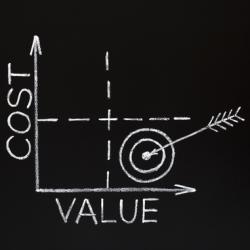

Another thing may seem clear to us, but it involves more of a cognitive leap: we assume that these items are of a higher quality than their non-luxury counterparts. In effect, what we are doing is making a strong association between the price and the quality of a good or service. Granted, there are good reasons to make that association to a point, because price does correlate with the materials, labor, and so forth that go into making an item. But at a certain point, high prices tend to be used as signals or markers of exclusivity rather than indications of the true worth of an item.
For instance, on a recent trip to England, I contemplated purchasing a Burberry wallet as a gift for my wife. But, given the exclusive luxury pricing of the item, combined with the weak exchange rate, the wallet would have cost roughly $250. Was the wallet nicer than one I might pick up at Wal-Mart for $15? Without question. But was it nicer than one I might pick up at Dillard’s department store for $50? Highly questionable. In the final analysis, then, I’d be better off giving her the $50 wallet filled with $200 in cash.
But plenty of people do buy that $250 wallet, and the question is why. The answer is that they assume that it is a higher quality item, that it is an exclusive brand, and that it will signal prestige to others, and that–through some sort of mental math–is somehow worth forking over the extra money.
Cut to health care. Does the same mentality apply? Is higher cost health care perceived as being higher quality? Is something better simply because it is more expensive? Based on the above analogy, you could answer yes, but only to a point. Beyond that, at some point, more health care spending is simply wasteful. But, how does it play out in practice?
Obviously, Americans spend a lot on health care, and it really comes down to two factors: prices and utilization. We’re looking at prices here. There are a variety of reasons why prices are a tad bit wonky in the U.S., including things like third-party payers and information asymmetry, but might patient perception also be a factor? The answer, according to a study funded by the Robert Wood Johnson Foundation, is yes. Asked whether higher quality care comes at a higher cost, 48% said yes, while 37% said there was no relationship, and the other 15% didn’t know or said “it depends.”
Framing the question in the negative, though, changed things. Asked whether lower quality care comes at a lower cost, only 29% said yes, while 46% said there was no relationship, and the other 25% didn’t know or said “it depends.” So, we appear to have succumbed to the idea that if you want high quality care, it’s going to cost you more, while we also seem to recognize that you can pay a lot and still receive low quality care.
What this should point out to us, is that the relationship between prices and quality in health care is limited, much like it is with other goods and services. Clearly, at lower levels, incremental increases in price are likely to reflect differences in quality, just like our wallet analogy. The real question is: At what point does the additional cost simply become a meaningless signal, unrelated to additional gains in quality, and representing excessively wasteful health care spending? And, more importantly, how do we ever convince people of this?
cost vs. value / shutterstock